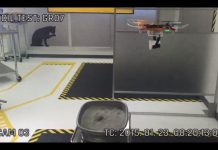
IMAGE: Baylor Scott & White Research Institute has received funding for a study from the National Institute of Biomedical Imaging and Bioengineering, one of the 27 institutes and centers of the…
view more
Credit: Baylor Scott & White Research Institute
DALLAS, TX (July 2020) – Baylor Scott & White Research Institute has received funding for a study from the National Institute of Biomedical Imaging and Bioengineering, one of the 27 institutes and centers of the National Institutes of Health (NIH), the nation’s premier medical research agency.
The study, titled Development and Validation of a Virtual Laparoscopic Hiatal Hernia Simulator (VLaHHS), will be led by principal investigator Ganesh Sankaranarayanan, Ph.D., the assistant director of the Center for Evidence Based Simulation with Baylor Scott & White Health’s Academic Simulation Program. Sankaranarayanan, together with a research team of surgeons and engineers, will develop and establish a virtual reality simulator designed with the intent to improve hiatal hernia surgery training, and ultimately, surgical outcomes.
Helping Surgeons Gain Proficiency in a Complex Procedure
Hiatal hernias, which occur when a part of the stomach pushes through a small opening in the diaphragm called the hiatus, have been linked to gastroesophageal reflux disease (GERD), which affects roughly 20 percent of the U.S. population. If left untreated, GERD can cause esophagitis, Barrett’s esophagus and esophageal adenocarcinoma, a form of esophageal cancer considered one of the fastest-growing causes of cancer mortality. In fact, the presence of hiatal hernia is thought to double the risk of esophageal cancer.
Hiatal hernia surgery commonly is used to correct these hernias. However, the anatomical location of the esophagus and the esophageal hiatus make this procedure incredibly complex. It typically has a learning curve of about 50 cases for a surgeon to gain enough skill to reduce recurrence of the hernia after surgery. To improve training for the complex procedure, Sankaranarayanan and his team will develop a real-time interactive hiatal hernia surgical simulator. Unique features such as accurate tissue properties and haptic (force) feedback will help enhance the experience for surgical residents and attendings and more effectively hone their skills in the virtual reality simulator, thereby improving outcomes by reducing surgical errors. Effectiveness of the VLaHSS will be measured by performing validation studies at Baylor Scott & White with general surgery residents and attendings.
Sankaranarayanan will be assisted in the NIH project by co-investigators Steven G. Leeds, MD, and Marc Ward, MD, from Baylor Scott & White, and by co-investigators Venkata Sreekanth Arikatla, Ph.D., and Andinet Enquobahrie, Ph.D., members of the medical computing team at Kitware Inc.
“With continued advancements in technologies such as virtual, augmented and immersive realities, virtual reality simulators are coming to the forefront as more accessible educational tools,” said Sankaranarayanan. “Virtual reality simulators provide a standardized training environment where a procedure can be practiced repeatedly to gain proficiency. They are presenting reliable and cost-effective options for training and education.”
This work is just the latest in a deep portfolio of work by Sankaranarayanan in the use of virtual reality simulation training. Other projects include virtual reality simulation for colorectal surgery, emergency airway training and immersive virtual reality simulation for safe medication administration.
###
More information about this grant can be found at https:/
About Baylor Scott & White Research Institute
Extending investigational expertise across more than 50 specialties areas, Baylor Scott & White Research Institute provides the business and regulatory infrastructure to accelerate medical breakthroughs and innovative new treatment models through clinical and translational activities. Baylor Scott & White Research Institute is present at sites and centers across Baylor Scott & White Health and maintains nearly 2,000 active trials each year.
About Baylor Scott & White Health
As the largest not-for-profit health system in the state of Texas, Baylor Scott & White Health promotes the health and well-being of every individual, family and community it serves. An integrated care delivery network, the system includes the Scott and White Health Plan, Baylor Scott & White Research Institute and Baylor Scott & White Quality Alliance. Through 52 hospitals and more than 1,100 access points including flagship academic medical centers in Dallas and Temple, the system offers the full continuum of care, from primary to award-winning specialty care, throughout Texas, and via virtual touchpoints. If its service area were a state, it would be the eighth largest, providing care to a population larger than that of the state of Georgia. Founded as a Christian ministry of healing, Baylor Scott & White is proud to honor its century-long legacy through its commitment to improving accessibility, affordability and the customer experience for all. For more information, visit BSWHealth.com
About The National Institutes of Health
The National Institutes of Health (NIH), the nation’s medical research agency, includes 27 Institutes and Centers and is a component of the U.S. Department of Health and Human Services. NIH is the primary federal agency conducting and supporting basic, clinical, and translational medical research, and is investigating the causes, treatments, and cures for both common and rare diseases. For more information about NIH and its programs, visit http://www.
TDnews














